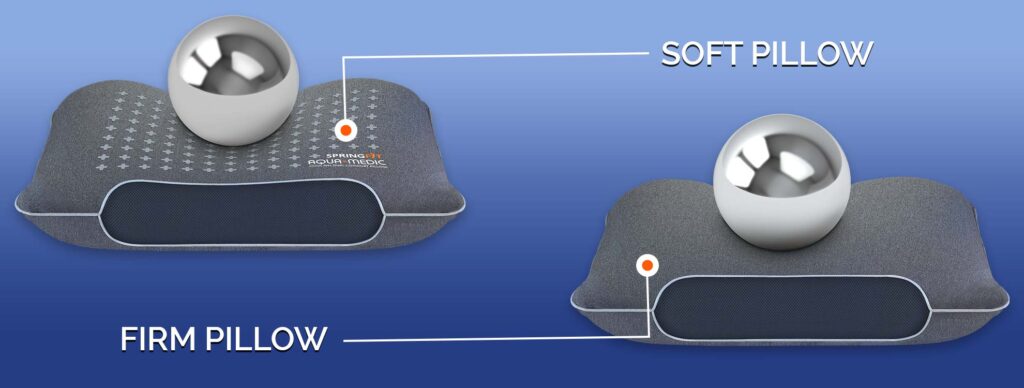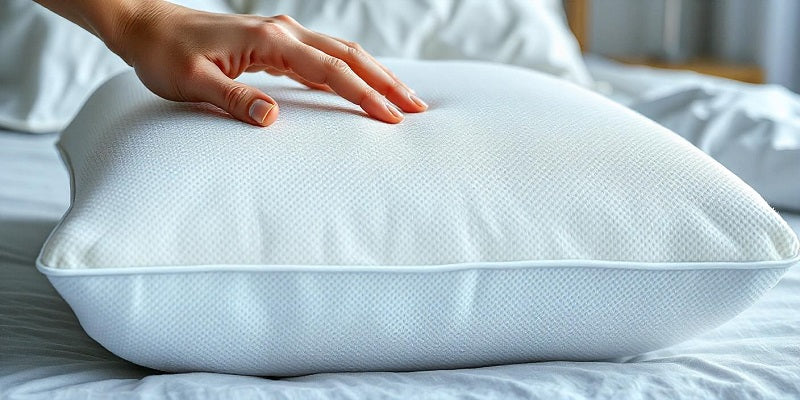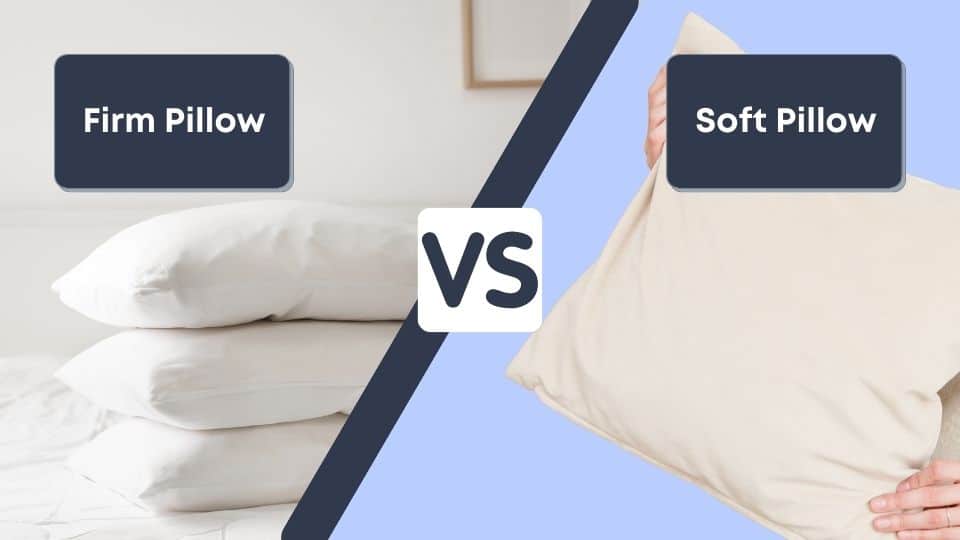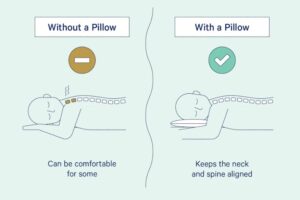Which pillow should I use for comfortable sleep? Should your pillow be soft or hard? The hard vs soft pillow debate is a serious topic of discussion for many sleepers.
There is no one right answer to this question because the firmness of a pillow is a personal matter. Some sleepers find soft pillows more comfortable, while some prefer firm pillows for better head support.
The right pillow is not just about comfort, but optimized alignment of the spine and neck. Imagine a pillow feels comfortable, but you end up with sore neck muscles. This is not a good pillow that is supposed to perform.
Understanding the Perfect Pillow Firmness
Pillow material and the fill inside the pillow determine the firmness of the pillow. Firmness is also described if a pillow is hard or soft. A hard pillow does not compress easily and is usually made of graphite latex or memory foam.

Pillows made of materials like wool and polyfill offer a softer and cushiony feel. A soft pillow is compressed easily and offers a more comfortable feel while sleeping.
What are the popular pillow firmness options? Most brands offer five different firmness levels for pillows:
- Soft
- Medium soft
- Medium
- Medium firm
- Firm
What is Pillow Loft?
You might have also read something about pillow loft while searching for the best pillow. You should not confuse pillow loft height with pillow firmness.
Firmness determines the ability of the pillow to maintain its shape, while pillow loft defines the height and thickness of the pillow.

Low loft pillows help to maintain a neutral angle between neck and the spine. High loft pillows offer better spinal alignment for side sleepers, offering more coverage for the space between neck and shoulders.
Difference Between Hard Pillow and Soft Pillow
Hard or soft pillow, what’s right for you? Any user can easily distinguish if he has a hard or soft pillow. Your pillow is soft, it is cushiony, comfy and easily compressible.
A hard pillow usually weighs more, cannot be compressed easily, and can maintain its shape under the weight of your head.
Pros and Cons of a Hard Pillow
For a better understanding of the winner between hard and soft pillows, we first need to analyze the advantages and disadvantages of both pillows.
For consistent and stable support, hard pillows are great, but they are not suitable for everyone. Here are the possible pros and cons of hard pillows.

Pros of Hard Pillows
Better Neck Support
Maintaining spinal alignment is the main purpose of using a hard pillow. Sleeping in a wrong position for a prolonged period can cause back pain.
The gap between neck and shoulders needs to be filled and hard pillows ensure to offer the required support. As your head does not sink easily, you don’t have to face any issues related to spinal alignment.
Durability
As material used in hard pillows is not delicate, these pillows have better lifespan than soft pillows. Memory foam pillows are usually available in hard pillow category and they require replacement less frequently.
Stability
Minimal compression prevents unwanted shifting of the pillow during sleep. As you don’t have to adjust your pillow repeatedly, hard pillows ensure a stable sleep experience.
Cons of Hard Pillows
Adjustment Period
For some reason if you are shifting from a soft pillow to a hard pillow, your body will take some time to adjust to the new firmness. Most people experience pain in the initial days. Once you are comfortable, hard pillows can be quite supportive and comfortable.
Limited Adaptability
Hard pillows don’t conform easily to your body shape. This can be a drawback for combo sleepers or people who toss and turn.
Pressure Issues
Some sleepers may find that firm pillows put pressure on sensitive areas like the ears or jaw, especially in side sleeping positions.
Pros and Cons of Soft Pillows
Now, let’s see how soft pillows might improve or impact your quality of sleep. Here are the potential advantages and disadvantages of soft pillows.

Pros of Soft Pillows
1. Plush Comfort
Soft pillows offer a luxurious, sink-in feel that many people find soothing, especially stomach sleepers or those with smaller frames.
2. Better for Pressure Relief
These pillows conform easily to the shape of your head and neck, reducing pressure points.
3. Flexible and Moldable
Soft pillows are easier to fluff, fold, and mold into different shapes depending on how you sleep.
Cons of Soft Pillows
1. Less Support
Overly soft pillows may collapse under the weight of your head, leading to misalignment in your spine.
2. Shorter Lifespan
Soft materials like down alternative or polyfill tend to wear out faster and flatten with time.
3. Can Trap Heat
Soft pillows made of certain synthetic materials may lack breathability and retain heat.
Soft Pillow vs Hard Pillow: Who Should Use What?
Here’s a simple guide to help you decide based on your sleep position and preferences:
| You Should Use a Soft Pillow If: | You Should Use a Hard Pillow If: |
| You sleep on your stomach | You sleep on your side or back |
| You prefer a cloud-like, plush feel | You need stable support for your neck and shoulders |
| You toss and turn a lot | You want your pillow to retain its shape all night |
| You have a smaller frame or lighter body weight | You experience neck or upper back pain |
| You like to mold or scrunch your pillow while sleeping | You want a durable, long-lasting option |
Introducing the Dual Comfort Pillow: The Best of Both Worlds
Still can’t decide between soft and firm? Meet the Dual Comfort Pillow. It is a revolutionary design with one soft side and one firm side.

Features:
- Customizable Comfort: Flip the pillow to the side that suits your mood or sleep position.
- Perfect for Combo Sleepers: Adapts to changing positions throughout the night.
- Great for Guests: Offers comfort options for anyone sleeping in your guestroom.
With a dual comfort pillow, you no longer have to choose between soft and hard. You can have both—whenever you need it.
How to Choose the Perfect Pillow Firmness
Selecting the perfect pillow firmness is not just about personal preference. It’s about supporting your neck, aligning your spine, and enhancing your overall sleep quality.

The right firmness depends on several factors, including your sleep position, body type, health needs, and even your mattress. Here’s a complete guide to help you choose the ideal pillow firmness:
1. Know Your Sleeping Position
Your preferred sleeping position is the most important factor in choosing pillow firmness:
- Side Sleepers
- Opt for medium-firm to firm pillows. You need extra support to fill the space between your head and shoulders and keep your spine aligned.
- Back Sleepers
- Choose a medium to medium-firm pillow. It should support your neck’s natural curve without pushing your head too far forward.
- Stomach Sleepers
- Go for a soft or low-loft pillow. A firm pillow can strain your neck by forcing it to bend unnaturally.
- Combination Sleepers
- A medium pillow or a dual comfort pillow (soft on one side, firm on the other) offers flexibility for position changes throughout the night.
2. Consider Your Body Frame and Weight
- Larger or Heavier Individuals
- Tend to benefit from firmer pillows that won’t compress under pressure and can provide consistent support.
- Smaller or Lighter Individuals
- Usually, I find soft to medium pillows more comfortable since they don’t require as much structural support.
3. Understand Your Mattress Firmness
Your pillow and mattress should work together to maintain spinal alignment:
- Firm Mattress
- Pair with a softer pillow, especially for side or back sleepers. The mattress doesn’t give much, so the pillow must cushion your head.
- Soft Mattress
- Go for a firmer pillow to avoid sinking in too much and throwing your spine out of line.
4. Assess Any Neck, Shoulder, or Back Issues
If you suffer from:
- Neck pain: Use a firm memory foam or contour pillow to support the natural cervical curve.
- Shoulder pain: A medium to firm pillow with pressure relief is ideal, especially for side sleepers.
- Back issues: Look for a pillow that aligns your upper spine, typically medium-firm in support.
5. Pay Attention to Pillow Fill Material
Different materials feel and behave differently:
- Memory Foam: Offers firmer, contouring support. Great for neck and back alignment.
- Latex: Firm, durable, and naturally supportive.
- Down/Feather: Soft and plush, but may not offer long-term support.
- Polyfill/Microfiber: Versatile, usually medium-firm, and affordable.
- Hybrid or Dual Comfort: Offers both soft and firm sides for adjustable comfort.
6. Test & Adjust
- Try Before You Commit: Look for pillows with a trial period if shopping online.
- Check Return Policies: You may need to test a pillow for a few nights to know if it’s right for you.
- Don’t Settle: Discomfort, headaches, or neck strain are signs you’ve picked the wrong firmness.
Final Tip: Pair Firmness with the Right Pillow Loft
Firmness isn’t everything. Make sure the loft (height) also suits your sleep position and neck length. A high-loft pillow that’s too soft or a low-loft pillow that’s too firm won’t deliver the support your body needs.
Summary Table
| You Should Choose | If You Are |
| Soft Pillow | Stomach sleeper, lightweight, prefers plush comfort |
| Medium Pillow | Back or combo sleeper, average build, needs balanced support |
| Firm Pillow | Side sleeper, heavier body frame, needs structured neck support |
Choosing the right pillow firmness is a mix of science and comfort. Pay attention to how your neck feels in the morning. That’s often the best indicator of whether your pillow is doing its job.
Conclusion
There’s no universally “right” answer in the firm vs soft pillow debate. It’s all about personal preference, sleep posture, and body needs.
Whether you choose soft, firm, or go for the innovative dual-comfort design, your goal should be to support your neck and spine alignment for deep, uninterrupted sleep.
Let your sleep style guide you, and don’t be afraid to experiment until you find your perfect match.






